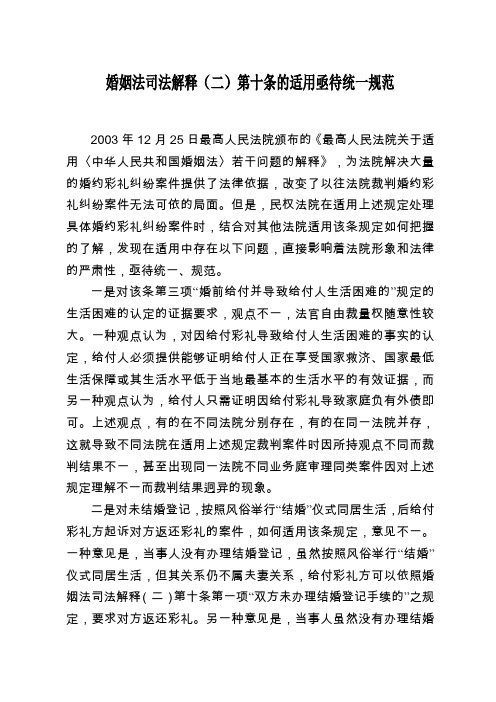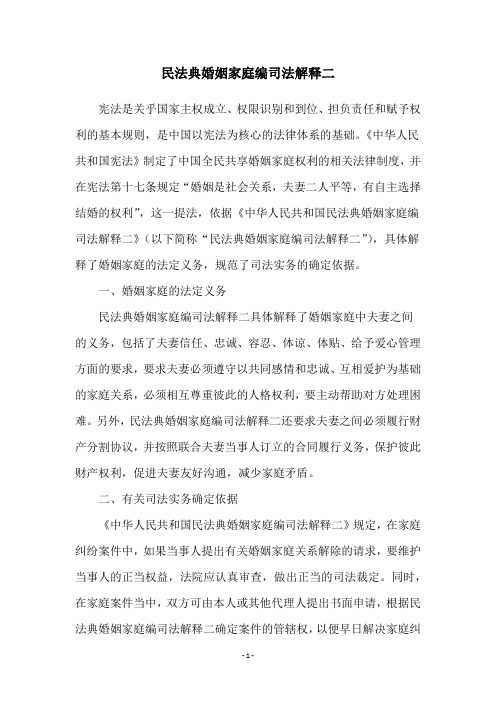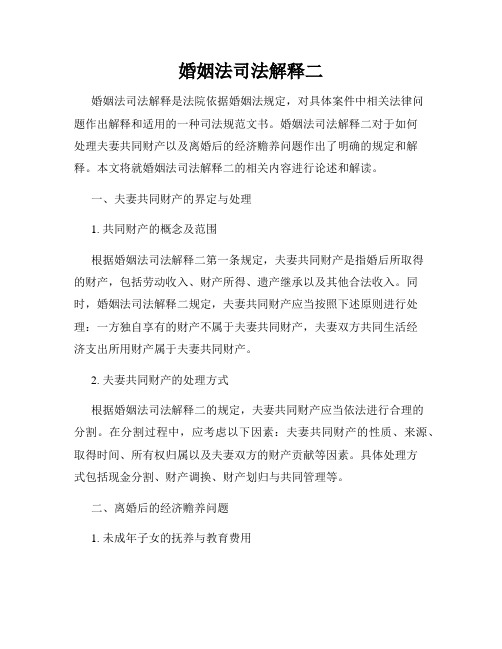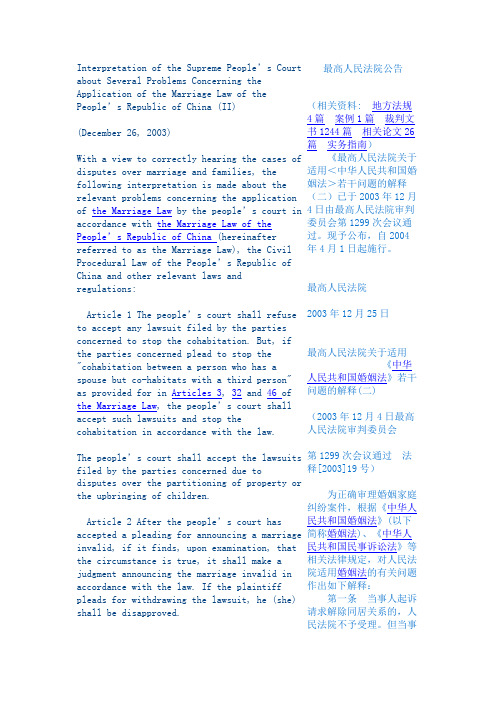【婚姻法司法解释二】中英双语解读
上海市高级人民法院关于适用最高人民法院婚姻法司法解释(二)若干

上海市高级人民法院关于适用最高人民法院婚姻法司法解释(二)若干问题的解答(一)【法规类别】婚姻法综合规定【发文字号】沪高法民一[2004]25号【发布部门】上海市高级人民法院【发布日期】2004.09.07【实施日期】2004.09.07【时效性】现行有效【效力级别】地方司法文件上海市高级人民法院关于适用最高人民法院婚姻法司法解释(二)若干问题的解答(一)(沪高法民一[2004]25号)一、夫妻一方个人财产在婚姻关系存续期间所取得的收益中,哪些属于司法解释(二)第十一条(一)项规定的“应当归夫妻双方共同所有的投资收益”?答:由于司法解释(二)对“投资收益”的概念并无明确界定,在诉讼中,对于当事人主张的所谓“投资收益”,应根据不同财产形态的性质区别认定:1、当事人以个人财产投资于公司或企业,若基于该投资所享有的收益是在婚姻关系存续期间取得的,则对该公司或企业生产经营产生的利润分配部分如股权分红等,依照《婚姻法》第十七条第(二)项的规定,应为夫妻双方共同所有;2、当事人将属于个人所有的房屋出租,因对房屋这类重大生活资料,基本上是由夫妻双方共同进行经营管理,包括维护、修缮,所取得的租金事实上是一种夫妻共同经营后的收入,因此,婚姻关系存续期间所得的租金一般认定为共同所有。
但若房屋所有人有证据证明事实上房屋出租的经营管理仅由一方进行,则婚姻存续期间的租金收益应归房产所有人个人所有。
3、当事人以个人财产购买债券所得的利息,或用于储蓄产生的利息,由于利息收益是债券或储蓄本金所必然产生的孳息,与投资收益具有风险性的物质不同,应依本金或原物之所有权归属为个人所有。
4、当事人以个人财产购买了房产、股票、债券、基金、黄金或古董等财产,在婚姻关系存续期间,因市场行情变化抛售后产生的增值部分,由于这些财产本身仅是个人财产的形态变化,性质上仍为个人所有之财产,抛售后的增值是基于原物交换价值的上升所致,仍应依原物所有权归属为个人所有。
婚姻法司法解释(二)第十条的适用亟待统一规范

婚姻法司法解释(二)第十条的适用亟待统一规范2003年12月25日最高人民法院颁布的《最高人民法院关于适用〈中华人民共和国婚姻法〉若干问题的解释》,为法院解决大量的婚约彩礼纠纷案件提供了法律依据,改变了以往法院裁判婚约彩礼纠纷案件无法可依的局面。
但是,民权法院在适用上述规定处理具体婚约彩礼纠纷案件时,结合对其他法院适用该条规定如何把握的了解,发现在适用中存在以下问题,直接影响着法院形象和法律的严肃性,亟待统一、规范。
一是对该条第三项“婚前给付并导致给付人生活困难的”规定的生活困难的认定的证据要求,观点不一,法官自由裁量权随意性较大。
一种观点认为,对因给付彩礼导致给付人生活困难的事实的认定,给付人必须提供能够证明给付人正在享受国家救济、国家最低生活保障或其生活水平低于当地最基本的生活水平的有效证据,而另一种观点认为,给付人只需证明因给付彩礼导致家庭负有外债即可。
上述观点,有的在不同法院分别存在,有的在同一法院并存,这就导致不同法院在适用上述规定裁判案件时因所持观点不同而裁判结果不一,甚至出现同一法院不同业务庭审理同类案件因对上述规定理解不一而裁判结果迥异的现象。
二是对未结婚登记,按照风俗举行“结婚”仪式同居生活,后给付彩礼方起诉对方返还彩礼的案件,如何适用该条规定,意见不一。
一种意见是,当事人没有办理结婚登记,虽然按照风俗举行“结婚”仪式同居生活,但其关系仍不属夫妻关系,给付彩礼方可以依照婚姻法司法解释(二)第十条第一项“双方未办理结婚登记手续的”之规定,要求对方返还彩礼。
另一种意见是,当事人虽然没有办理结婚登记,但按照风俗举行“结婚”仪式同居生活,让群众看来,当事人是以夫妻关系名义共同生活的,与登记结婚没有实质性区别。
同时,该意见认为,婚姻法司法解释(二)第十条第一项规定的“双方未办理结婚登记手续的”,具体是指当事人既未办理结婚登记手续、也未共同生活的情形,故对该类案件,不应支持给付方的请求。
第三种意见是,认为“双方未办理结婚登记手续的具体是指当事人既未办理结婚登记手续,也未共同生活的情形”的观点,实际上是对婚姻法司法解释(二)第十条第一项规定的限制解释,有悖该条规定的本义。
最高人民法院婚姻法司法解释(二)的理解与适用

夫妻
内容摘要
为帮助大家更准确地理解2004年4月1日《最高人民法院关于适用〈中华人民共和国婚姻法〉若干问题的解释 (二)》的内容及指导思想,让广大民众学会用法律的武器维护自己的合法权益,让法官们更准确地适用《婚姻 法》,最高人民法院民事审判第...
目录分析
二、关于人民法院 审理无效婚姻案件
的有关规定
读书笔记
这是《最高人民法院婚姻法司法解释(二)的理解与适用》的读书笔记模板,可以替换为自己的心得。
精彩摘录
这是《最高人民法院婚姻法司法解释(二)的理解与适用》的读书笔记模板,可以替换为自己的精彩内容摘 录。
作者介绍
这是《最高人民法院婚姻法司法解释(二)的理解与适用》的读书笔记模板,暂无该书作者的介绍。
财 题 院
申请财产保
全时,人民
法院如何确
定申请人所
应当提供的
担保数额问
题
0 6
十二、关于 《婚姻法司 法解释 (二)》的 效力问题
第二部分 条文全本
最高人民法院民一 庭负责人就婚姻法 司法解释(二)答
问
最高人民法院民一 庭负责人在公布
《关于适用制中华 人民共和国婚姻法 了若干问题的解释 (二)》新闻发布
谢谢观看
பைடு நூலகம்
最高人民法院婚姻法司法解释(二) 的理解与适用
读书笔记模板
01 思维导图
03 目录分析 05 精彩摘录
目录
02 内容摘要 04 读书笔记 06 作者介绍
思维导图
关键字分析思维导图
问题
规定
最高人民 法院
司法解 释
婚姻法
合法权益
最高人民法院
解释
问题
关系
民法典婚姻家庭编司法解释二

民法典婚姻家庭编司法解释二宪法是关乎国家主权成立、权限识别和到位、担负责任和赋予权利的基本规则,是中国以宪法为核心的法律体系的基础。
《中华人民共和国宪法》制定了中国全民共享婚姻家庭权利的相关法律制度,并在宪法第十七条规定“婚姻是社会关系,夫妻二人平等,有自主选择结婚的权利”,这一提法,依据《中华人民共和国民法典婚姻家庭编司法解释二》(以下简称“民法典婚姻家庭编司法解释二”),具体解释了婚姻家庭的法定义务,规范了司法实务的确定依据。
一、婚姻家庭的法定义务民法典婚姻家庭编司法解释二具体解释了婚姻家庭中夫妻之间的义务,包括了夫妻信任、忠诚、容忍、体谅、体贴、给予爱心管理方面的要求,要求夫妻必须遵守以共同感情和忠诚、互相爱护为基础的家庭关系,必须相互尊重彼此的人格权利,要主动帮助对方处理困难。
另外,民法典婚姻家庭编司法解释二还要求夫妻之间必须履行财产分割协议,并按照联合夫妻当事人订立的合同履行义务,保护彼此财产权利,促进夫妻友好沟通,减少家庭矛盾。
二、有关司法实务确定依据《中华人民共和国民法典婚姻家庭编司法解释二》规定,在家庭纠纷案件中,如果当事人提出有关婚姻家庭关系解除的请求,要维护当事人的正当权益,法院应认真审查,做出正当的司法裁定。
同时,在家庭案件当中,双方可由本人或其他代理人提出书面申请,根据民法典婚姻家庭编司法解释二确定案件的管辖权,以便早日解决家庭纠纷。
同时,对于孩子的抚养问题,《民法典婚姻家庭编司法解释二》明确规定,夫妻应遵守国家规定,勤勉地抚养和管教子女,以及实行离婚协议,共同抚养子女,承担家庭财产损失和婚姻破裂损失等准则。
三、总结《中华人民共和国民法典婚姻家庭编司法解释二》对婚姻家庭关系的解释,为法律进行实施和判决提供了依据,使司法实践具有更多的解释和实施方面的细节。
它以宪法第十七条规定的有关婚姻家庭权利体系为基础,界定了婚姻家庭的法定义务,确定了司法实务的确定依据,为了促进夫妻友好沟通,保护双方的权利。
婚姻法名词解释的英文翻译

婚姻法名词解释的英文翻译Marriage Law Terminology: English Translations for UnderstandingIntroduction:Marriage, as a vital institution in every society, holds immense significance in the lives of individuals. It is a complex institution that involves legal, emotional, and social aspects, which vary across cultures. In this article, we aim to provide English translations for key terms in the field of marriage law. By understanding these terms, individuals can gain insights into the legal framework surrounding marriage.1. Marriage Registration - 婚姻登记Marriage registration is the process through which a marriage is legally recognized by the government. It involves filing the necessary documents, providing proof of eligibility, and obtaining a marriage certificate. This certificate serves as legal evidenceof the marriage.2. Pre-Marital Agreement - 婚前协议A pre-marital agreement, often referred to as a prenuptial agreement or a prenup, is a contract between prospective spouses that outlines how their property, assets, and other matters would be divided in the event of divorce, separation, or death. It helps to clarify financial expectations and protect individual interests.3. Marital Property - 夫妻共同财产Marital property refers to assets and debts acquired by a couple during their marriage. In many jurisdictions, marital property is subject to equitable distribution upon divorce or separation. It includes real estate, investments, savings accounts, vehicles, and other possessions acquired jointly during the marriage.4. Child Custody - 子女抚养权Child custody refers to the legal authority given to a parent to make decisions regarding the upbringing and well-being of a child. This includes decisions about education, healthcare, religion, and general welfare. Custody may be awarded solely to one parent (sole custody) or shared between both parents (joint custody).5. Alimony - 赡养费Alimony, also known as spousal support or maintenance, refers to payments made by one spouse to the other after a divorce or legal separation. It is typically provided to ensure the financial well-being of the receiving spouse, especially if there is a significant disparity in income or one spouse has been economically dependent on the other.6. Divorce - 离婚Divorce is the legal dissolution of a marriage, ending the marital union, and releasing both parties from their marriage obligations. It involves the court process, where issues such as child custody, division of assets, and spousal support are resolved. Grounds for divorce vary across jurisdictions and may include irreconcilable differences, infidelity, or abuse.7. Annulment - 宣告婚姻无效An annulment is a legal declaration that a marriage was invalid from the beginning, making it void or null. Unlike divorce, which dissolves a valid marriage, an annulment states that there was no valid marriage to begin with due to factors like fraud, bigamy, underage marriage, or lack of mental capacity.8. Domestic Violence - 家庭暴力Domestic violence refers to abusive behavior within a household that harms the physical, emotional, or psychological well-being of a family member. It can occur between spouses, parents and children, or any other family members. Domestic violence is a serious crime and can lead to legal protection orders, temporary or permanent separation, and criminal charges.Conclusion:Understanding the terminology associated with marriage law is crucial for individuals navigating the complexities of marital relationships. Armed with knowledge of these terms, people can make informed decisions regarding their marriages, seek legal advice when necessary, and protect their rights and interests. However, it is essential to remember that legal systems and terminology may vary across countries and jurisdictions; hence, it is advisable to consult local resources or legal professionals for accurate information.。
婚姻法司法解释二

婚姻法司法解释二婚姻法司法解释是法院依据婚姻法规定,对具体案件中相关法律问题作出解释和适用的一种司法规范文书。
婚姻法司法解释二对于如何处理夫妻共同财产以及离婚后的经济赡养问题作出了明确的规定和解释。
本文将就婚姻法司法解释二的相关内容进行论述和解读。
一、夫妻共同财产的界定与处理1. 共同财产的概念及范围根据婚姻法司法解释二第一条规定,夫妻共同财产是指婚后所取得的财产,包括劳动收入、财产所得、遗产继承以及其他合法收入。
同时,婚姻法司法解释二规定,夫妻共同财产应当按照下述原则进行处理:一方独自享有的财产不属于夫妻共同财产,夫妻双方共同生活经济支出所用财产属于夫妻共同财产。
2. 夫妻共同财产的处理方式根据婚姻法司法解释二的规定,夫妻共同财产应当依法进行合理的分割。
在分割过程中,应考虑以下因素:夫妻共同财产的性质、来源、取得时间、所有权归属以及夫妻双方的财产贡献等因素。
具体处理方式包括现金分割、财产调换、财产划归与共同管理等。
二、离婚后的经济赡养问题1. 未成年子女的抚养与教育费用婚姻法司法解释二规定,离婚后夫妻对未成年子女的抚养与教育费用由夫妻双方共同承担,并依法确定抚养方式和费用。
离婚后,父母应依法履行抚养义务,确保子女的正常成长和健康发展。
2. 弱势方的生活费用和权益保障婚姻法司法解释二明确指出,离婚后,对于无工作能力或者无劳动能力的一方,对其生活费用进行保障是必要的。
同时,离婚后,如果一方因婚姻导致了经济、身体、精神上的损害,另一方应承担相应的责任,并给予经济赔偿。
三、遗产继承问题婚姻法司法解释二对于离婚后的遗产继承问题作出了明确规定。
根据法律规定,离婚后的夫妻自愿约定遗产继承权益,应当依法保护其合法权益。
如果双方在离婚协议中约定了遗产继承问题,应当依照协议履行;如果未约定或者约定不明确,将依照婚姻法的相关规定处理。
四、对婚姻法司法解释二的评价婚姻法司法解释二的出台,对于规范夫妻共同财产的处理方式、离婚后的经济赡养问题以及遗产继承问题起到了积极的推动作用。
【婚姻法司法解释二】中英双语

Interpretation of the Supreme People’s Court about Several Problems Concerning the Application of the Marriage Law of the People’s Republic of China (II)(December 26, 2003)With a view to correctly hearing the cases of disputes over marriage and families, the following interpretation is made about the relevant problems concerning the application of the Marriage Law by the people’s court in accordance with the Marriage Law of the People’s Republic of China (hereinafter referred to as the Marriage Law), the Civil Procedural Law of the People’s Republic of China and other relevant laws and regulations:Article 1 The people’s court shall refuse to accept any lawsuit filed by the parties concerned to stop the cohabitation. But, if the parties concerned plead to stop the "cohabitation between a person who has a spouse but co-habitats with a third person" as provided for in Articles 3, 32 and 46 of the Marriage Law, the people’s court shall accept such lawsuits and stop the cohabitation in accordance with the law.The people’s court shall accept the lawsuits filed by the parties concerned due to disputes over the partitioning of property or the upbringing of children.Article 2 After the people’s court has accepted a pleading for announcing a marriage invalid, if it finds, upon examination, that the circumstance is true, it shall make a judgment announcing the marriage invalid in accordance with the law. If the plaintiff pleads for withdrawing the lawsuit, he (she) shall be disapproved.最高人民法院公告(相关资料: 地方法规4篇案例1篇裁判文书1244篇相关论文26篇实务指南)《最高人民法院关于适用<中华人民共和国婚姻法>若干问题的解释(二)已于2003年12月4日由最高人民法院审判委员会第1299次会议通过。
婚姻法》司法解释(二)解读

婚姻法》司法解释(二)解读2003年12月28日,最高人民法院对外公布了婚姻法的第二个司法解释。
《关于适用〈中华人民共和国婚姻法〉若干问题的解释(二)》共29条,其中三分之二涉及解决夫妻财产的分割和夫妻债权债务问题的处理。
《解释(二)》自明年4月1日起施行。
解除同居关系法院一般不管《解释(二)》规定,当事人起诉请求解除同居关系的,法院不予受理。
但如果请求解除同居关系的当事人是有配偶者,法院应当受理并依法予以解除。
至于无婚姻关系的男女双方的同居关系,因为不是法律保护的社会关系,当事人如果起诉仅仅要求解除同居关系,法院不予受理。
但当事人如果就同居期间的财产分割或者子女抚养纠纷提起诉讼的,法院应当受理。
死后也可宣告婚姻无效《解释(二)》对无效婚姻进一步规范。
规定法院受理申请宣告婚姻无效案件后,经审查确属无效婚姻的,应当依法作出宣告婚姻无效的判决。
原告申请撤诉的,不予准许。
夫妻一方或者双方死亡后1年内,生存一方或者利害关系人申请宣告婚姻无效的,法院应当受理。
法院就同一婚姻关系分别受理了离婚和申请宣告婚姻无效案件的,对于离婚案件的审理,应当待申请宣告婚姻无效案件作出判决后进行。
3种情况可以返还彩礼《解释(二)》规定了返还彩礼的3种条件:双方未办理结婚登记手续的;在离婚的前提下,双方办理结婚登记手续但确未共同生活的,或者婚前给付导致给付人生活困难的。
婚前父母买的房归自己儿女解释规定,结婚前,父母为双方购置房屋出资的,该出资应当认定为对自己子女的个人赠与,除非父母明确表示赠与双方。
结婚后,父母为双方购置房屋出资的,该出资应当认定为对夫妻双方的赠与,除非父母明确表示赠与一方。
离婚时双方对尚未取得所有权或者尚未取得完全所有权的房屋有争议且协商不成的,法院不宜判决房屋所有权的归属,应当根据实际情况判决由当事人使用。
当事人取得完全所有权后,有争议的,可以另行向法院提起诉讼。
婚后一人欠债两人担《解释(二)》以债务形成于婚前还是婚后为切入点,规定婚前一方以个人名义所欠外债,原则上应当认定为个人债务,债权人向其配偶主张权利时,除非债权人能够举证证明该债务用于婚后家庭共同生活,否则法院不支持由夫妻双方共同偿还。
- 1、下载文档前请自行甄别文档内容的完整性,平台不提供额外的编辑、内容补充、找答案等附加服务。
- 2、"仅部分预览"的文档,不可在线预览部分如存在完整性等问题,可反馈申请退款(可完整预览的文档不适用该条件!)。
- 3、如文档侵犯您的权益,请联系客服反馈,我们会尽快为您处理(人工客服工作时间:9:00-18:30)。
Interpretation of the Supreme People’s Court about Several Problems Concerning the Application of the Marriage Law of the People’s Republic of China (II)(December 26, 2003)With a view to correctly hearing the cases of disputes over marriage and families, the following interpretation is made about the relevant problems concerning the application of the Marriage Law by the people’s court in accordance with the Marriage Law of the People’s Republic of China (hereinafter referred to as the Marriage Law), the Civil Procedural Law of the People’s Republic of China and other relevant laws and regulations:Article 1 The people’s court shall refuse to accept any lawsuit filed by the parties concerned to stop the cohabitation. But, if the parties concerned plead to stop the "cohabitation between a person who has a spouse but co-habitats with a third person" as provided for in Articles 3, 32 and 46 of the Marriage Law, the people’s court shall accept such lawsuits and stop the cohabitation in accordance with the law.The people’s court shall accept the lawsuits filed by the parties concerned due to disputes over the partitioning of property or the upbringing of children.Article 2 After the people’s court has accepted a pleading for announcing a marriage invalid, if it finds, upon examination, that the circumstance is true, it shall make a judgment announcing the marriage invalid in accordance with the law. If the plaintiff pleads for withdrawing the lawsuit, he (she) shall be disapproved.最高人民法院公告(相关资料: 地方法规4篇案例1篇裁判文书1244篇相关论文26篇实务指南)《最高人民法院关于适用<中华人民共和国婚姻法>若干问题的解释(二)已于2003年12月4日由最高人民法院审判委员会第1299次会议通过。
现予公布,自2004年4月1日起施行。
最高人民法院2003年12月25日最高人民法院关于适用《中华人民共和国婚姻法》若干问题的解释(二)(2003年12月4日最高人民法院审判委员会第1299次会议通过法释[2003]19号)为正确审理婚姻家庭纠纷案件,根据《中华人民共和国婚姻法》(以下简称婚姻法)、《中华人民共和国民事诉讼法》等相关法律规定,对人民法院适用婚姻法的有关问题作出如下解释:第一条当事人起诉请求解除同居关系的,人民法院不予受理。
但当事Article 3 After the people’s court has accepted a suit of divorce, if it finds, upon examination, that the marriage is invalid, it shall inform the parties concerned of this and shall make a judgment announcing the marriage invalid.Article 4 Where the people’s court hears a case of invalid marriage involving the partitioning of property or the upbringing of children, it shall make separate a ruling about the determination of the validity of marriage and about the handling of other disputes respectively.Article 5 Within a year after the death of either the husband or wife or both of the husband and wife, if the existing party or the interested party files an application for announcing the marriage invalid, the people’s court shall accept the application.Article 6 If the interested party files an application to the people’s court for announcing a marriage invalid in accordance with Article 10 of the Marriage law, the interested party shall be the applicant, and the two parties to the marriage shall be the parties against whom the application is filed.If either the husband or wife is dead, the existing party shall be the party against whom an application is filed.If both of the husband and wife are dead, they shall not be listed as the parties against whom an application is filed.Article 7 Where, with regard to a same marriage, the people’s court has accepted a suit of divorce and an application for announcing the marriage invalid, it shall hear the case of divorce after it has made a 人请求解除的同居关系,属于婚姻法第三条、第三十二条、第四十六条规定的“有配偶者与他人同居”的,人民法院应当受理并依法予以解除。
当事人因同居期间财产分割或者子女抚养纠纷提起诉讼的,人民法院应当受理。
(相关资料: 裁判文书19篇相关论文2篇)第二条人民法院受理申请宣告婚姻无效案件后,经审查确属无效婚姻的,应当依法作出宣告婚姻无效的判决。
原告申请撤诉的,不予准许。
(相关资料: 相关论文1篇实务指南)第三条人民法院受理离婚案件后,经审查确属无效婚姻的,应当将婚姻无效的情形告知当事人,并依法作出宣告婚姻无效的判决。
(相关资料: 裁判文书1篇实务指南)第四条人民法院审理无效婚姻案件,涉及财产分割和子女抚养的,应当对婚姻效力的认定和其他纠纷的处理分别制作裁判文书。
(相关资料: 裁判文书2篇实务指南)第五条夫妻一方或者双方死亡后一年内,生存一方或者利害关系人依据婚姻法第十条的规定申请宣告婚姻无效的,人民法院应当受理。
(相关资料: 裁判文书1篇实务指南)judgment about the case of applying for announcing the marriage invalid.After the marriage as mentioned in the preceding paragraph is announced invalid, if it is related to the partitioning of property or the upbringing of children, the hearing shall continue.Article 8 The clauses about thepartitioning of property in a divorce agreement or the agreement reached by the parties concerned on the partitioning of property shall be binding on both the husband and wife.Where the party concerned files a lawsuit due to disputes over the above-mentioned agreement on the partitioning of property, the people’s court shall accept the lawsuit.Article 9 Within one year after the husband and wife are divorced on the basis of agreement, if they back out on the issue concerning partitioning of property and files a suit for modifying or canceling the agreement on the partitioning of property, the people’s court shall accept their application.After the people’s court has accepted their suit, if it finds that no circumstance of fraud or coercion exists when the agreement on the partitioning of property is established, it shall dismiss the pleading of the parties concerned.Article 10 If it is found that the pleading of a party concerned for the return of the betrothal gifts given to the other party according to the tradition is under any of the following circumstances, the people’s court shall support him or her:第六条利害关系人依据婚姻法第十条的规定,申请人民法院宣告婚姻无效的,利害关系人为申请人,婚姻关系当事人双方为被申请人。
